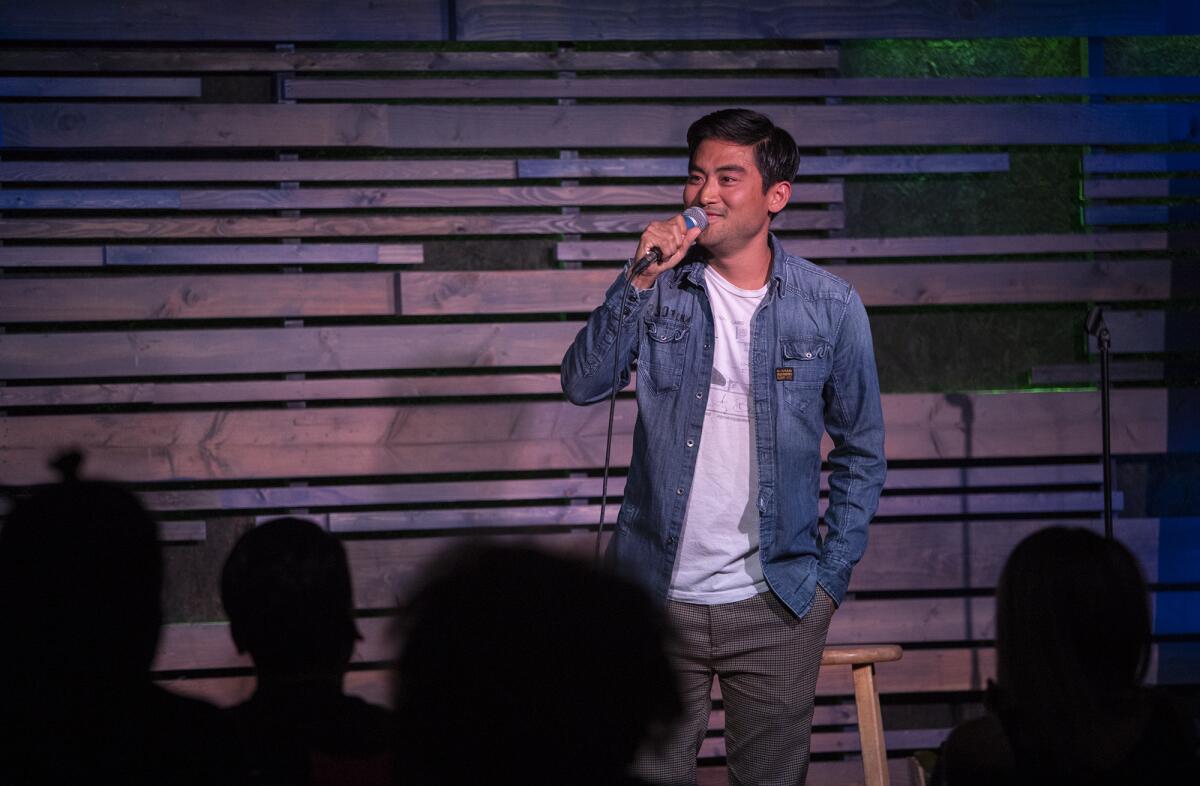Derek Mio feels ‘destined’ for his role in AMC’s ‘The Terror: Infamy,’ which tells his family history
- Share via
For an actor currently being lauded for his starring role in a horror-drama series, Derek Mio has quite the sense of humor.
He was recently back in his hometown of Huntington Beach, doing stand-up comedy at the Rec Room.
“I do this bit where I wonder what people in the internment camps would chant during their baseball games,” Mio said, before singing, to the tune of the seventh-inning stretch, “Take us out of this prison, give us back all our [expletive]!”
The actor, who identifies as yonsei, or fourth-generation Japanese American, stars in the second season of AMC’s horror anthology series, “The Terror,” which follows a group of Japanese Americans from Terminal Island as they are rounded up and incarcerated during World War II.
As if the horror of being taken from their homes and having their patriotism questioned isn’t enough, an evil spirit, or bakemono, travels with the characters and haunts them wherever they go.
Mio’s character, Chester Nakayama, is a young photographer with dreams of moving to the mainland and becoming someone more important than his fisherman father. After his life is disrupted by the executive order that allows for his community’s removal, he enlists as a Japanese translator for the Military Intelligence Service, or the MIS.
Chester also happens to be a composite of both of Mio’s grandfathers: one was from Terminal Island and taken to a camp in Manzanar during WWII, the other was living in Hawaii when Pearl Harbor was bombed and enlisted in the MIS.
“Getting to tell my family’s story on such a big platform is a special experience, to say the least,” Mio said.

Growing up in Huntington Beach, Mio attended Orange County Buddhist Church, a church in Anaheim with a predominantly Japanese American membership, and engaged in all the youth activities that came with it.
He joined the Boy Scouts, attended dharma school on weekends, played the taiko drums Sunday mornings before church, and played for OCBC’s basketball team in a mostly-Japanese American league.
Before long, Mio developed two distinct groups of friends: his white friends he’d see at school throughout the week, and his Japanese friends he’d hang out with on weekends.
“It was like I was living in two different worlds,” Mio said.
The Oscars were always a big event at home. His mom would cook dinner, and they’d all admire the red carpet looks and celebrate the evening’s winners.
But it wasn’t until college that Mio realized his dream of becoming an actor. On his way home from a college tour at UCLA, his initial No. 1 pick, Mio and his family stopped by USC and toured the film school.
He was won over by his favorite directors’ names on the buildings and the sweeping auditoriums students could expect to take their classes in.
“When the acceptance letter came, I had to take it to my room and have a moment to myself,” Mio recalled. “It was like in ‘Willy Wonka & the Chocolate Factory’ when Charlie opens his chocolate bar and finds the golden ticket.”
In his third year at USC, Mio was cast by director Chris Tashima in his first lead role in a 2003 movie called “Day of Independence,” a historical drama about a Japanese American family as they cope with daily life in a concentration camp through baseball.
The role solidified Mio’s decision to pursue acting. The movie was entered into film festivals, where he met his manager, found an agent, and began booking jobs including a recurring role on “Greek,” and guest spots on “Hawaii Five-0” and “Bones.”
Nothing has inspired him to reflect on himself and his family as much as “The Terror” has, though. After the show wrapped filming in Vancouver, Mio visited Japan for the first time in more than 20 years to reconnect with his family members still living there.
He was able to use some of the Japanese he learned from the dialect coach on set to communicate with them.
“I met up with my grandpa’s niece, who told me stories of my grandpa doing silly Elvis impressions during karaoke,” Mio said. “I do a lot of impressions too, especially in my stand-up. I couldn’t help but think, ‘so that’s where I get it from.’ ”
Since giving up his Los Angeles apartment when he flew to film “The Terror” in Vancouver, Mio has moved back to Huntington Beach, where he plans on doing more stand-up, spending time with his nephews, and eating at Fuji’s Famous Burger, where he used to go with his friends in high school.
He continues to receive encouraging messages from not only people he knows in the community, but also from strangers who are just learning about the history of Japanese American incarceration for the first time.
“I was just thinking about the fact that my grandpa had to go to Utah for college in order to leave the camp, and he ended up meeting my grandma in Utah,” Mio said. “So really, I wouldn’t be here if it wasn’t for the war or internment. I feel like I was destined to play this role.”
All the latest on Orange County from Orange County.
Get our free TimesOC newsletter.
You may occasionally receive promotional content from the Daily Pilot.



